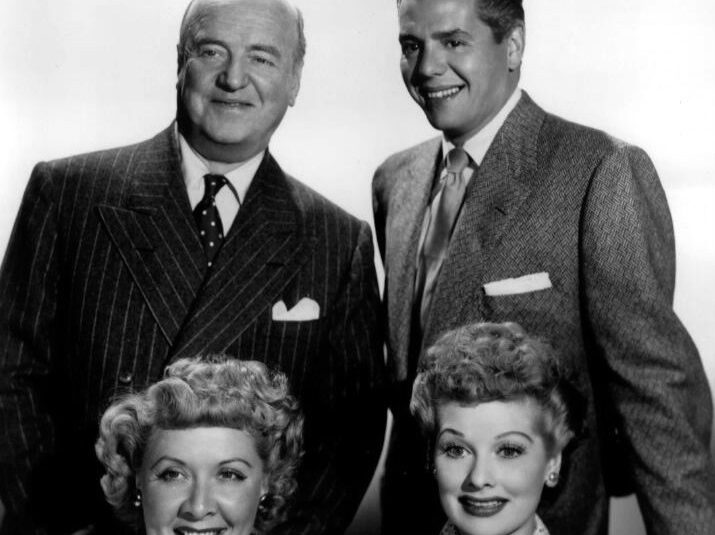We’re watching I Love Lucy, the sitcom that defined sitcoms. While many would think humor doesn’t translate over the decades – I Love Lucy holds up. You’ll laugh, probably out loud. Some of the antics just plain stand up to the time. Other bits are hilarious because you might not think anyone would try some of this stuff in the 1950s.
I Love Lucy not only showcased the brilliant slapstick comedy of Lucille Ball, but also provided the template for all sitcoms to come. It was the first sitcom to use the three-camera technique combined with a live studio audience, setting a groundbreaking standard for television production.
You can pick up a copy of I Love Lucy: The Complete Series here (affiliate link).
- What Made I Love Lucy Innovative
- The Brilliance of Lucille Ball
- The Innovation of Desi Arnaz
- Season 1 – Where we’re at
What Made I Love Lucy Innovative
Three-Camera Setup:
Instead of shooting scenes sequentially like in a play, I Love Lucy used three cameras simultaneously to capture different angles (wide shot and two close-ups). This allowed for seamless scene coverage and efficient editing.
Live Studio Audience:
Unlike other early sitcoms that relied on canned laughter, I Love Lucy was filmed in front of a live studio audience, giving the show authentic reactions and an engaging energy.
Film Quality:
To preserve the high-quality footage for syndication, it was shot on 35mm film instead of being broadcast live. This innovation helped the show remain timeless and set the industry standard. As video became a quality format, we began to see sitcoms recorded to video tape in front of a live studio audience.
This method, pioneered by I Love Lucy’s producer Desi Arnaz and director Karl Freund, became the dominant format for sitcoms,
We’re working through the first season and finding items that will become common tropes in sitcoms.
The Brilliance of Lucille Ball
Lucille Ball’s enduring comedic genius stemmed from a rare combination of physicality, timing, and fearlessness, paired with a deep understanding of her craft. Here’s what made her so funny:
Master of Physical Comedy
Lucille Ball had an unparalleled ability to use her body to generate laughs. Whether she was stomping grapes in I Love Lucy’s iconic vineyard scene or struggling with conveyor belt chocolates, her exaggerated movements and facial expressions made her universally hilarious without needing dialogue.
Impeccable Timing
Comedy is all about timing, and Lucy had it in spades. She knew when to stretch a gag for maximum effect and when to deliver a punchline with precision. Her sense of rhythm in comedic setups and payoffs was masterful.
Fearlessness
Lucy wasn’t afraid to look ridiculous, make a mess, or push boundaries. She leaned into absurd situations with complete commitment, whether pretending to be a clueless opera singer or disguising herself as part of a salad.
Relatable Humor
Her comedy often stemmed from everyday situations exaggerated to absurd levels. Lucy’s attempts to break into showbiz, her get-rich-quick schemes, or trying to impress her husband resonated with audiences because they saw a bit of themselves in her.
Versatile Facial Expressions
Lucy could say more with a raised eyebrow or a quivering lip than many could with an entire script. Her expressive face was a canvas for every emotion, making her reactions just as funny as her antics.
Chemistry with Co-Stars
Lucille Ball’s interactions with Desi Arnaz, Vivian Vance, and William Frawley elevated her comedy. Their dynamic chemistry created a sense of family and friendship that made every joke land even harder.
Revolutionary Vision
As a pioneer in television, Lucy had a knack for creating situations that pushed comedic boundaries. Beyond acting, she was a producer who shaped her show to highlight her unique humor.
In short, Lucille Ball was a comedic powerhouse whose talents transcended generations. Her humor remains as fresh today as it was when she first took to the small screen.
I Love Lucy is the show that defined the sitcom. Sure, others had attempted to create it, but Lucy did it first.
Innovation of Desi Arnaz
Desi Arnaz was not only Lucille Ball’s on-screen husband in I Love Lucy, but he was also a visionary behind the scenes. His contributions were pivotal in shaping the television industry and ensuring the success of the show. Here’s how Desi Arnaz made a lasting impact:
Pioneering the Multi-Camera Sitcom Format
Arnaz, along with director Karl Freund, developed the three-camera setup for filming I Love Lucy. This method allowed for dynamic shots from multiple angles and efficient editing, while maintaining the feel of a live performance.
Introducing Filmed TV Sitcoms
At the time, most shows were broadcast live, which limited quality and syndication potential. Arnaz insisted that I Love Lucy be shot on 35mm film in front of a live audience, ensuring high production value and allowing the show to be rerun—creating the modern syndication model.
Founding Desilu Productions
Arnaz co-founded Desilu Productions with Lucille Ball. The company produced I Love Lucy and later became one of the most influential studios in Hollywood, responsible for shows like The Untouchables and Star Trek.
Championing Diverse Representation
Arnaz, a Cuban-American, broke barriers as one of the first Latinos in a lead role on American television. He normalized interracial relationships on screen by playing Lucy’s husband, Ricky Ricardo, and brought his cultural background into the show through music and character development.
Syndication Model Innovator
Arnaz negotiated for Desilu Productions to retain ownership of the I Love Lucy episodes. This decision was revolutionary, as it allowed the episodes to be rerun in syndication, creating a massive revenue stream and reshaping how TV shows generated income.
Integrating Music into Sitcoms
As a talented musician and bandleader, Arnaz made Ricky Ricardo’s nightclub performances a regular part of I Love Lucy. These musical interludes not only showcased his talents but also brought a fresh, lively energy to the show.
Revolutionizing TV Production Techniques
Arnaz introduced innovations such as the “rerun” to allow Lucille Ball time off during her pregnancy. He also helped standardize the practice of performing sitcoms before a live studio audience, capturing genuine laughter and audience reactions.
Business Acumen and Leadership
Arnaz was a brilliant businessman, managing the logistical challenges of producing I Love Lucy and leading Desilu Productions. His foresight and negotiation skills ensured the show’s longevity and profitability.
In summary, Desi Arnaz wasn’t just a comedic partner to Lucille Ball—he was a trailblazing producer and entrepreneur whose contributions transformed television production and distribution forever.
Season 1 – Where we’re at
You can pick up a copy of I Love Lucy: The Complete Series here (affiliate link).
Currently we’re in Season 1.
The format of the show is locked in from the start. There are a couple of templates you can expect:
- Lucy tries to get in on Ricky’s nightclub act.
- Lucy and Ethel try to scheme their husbands into something they want.
Outstanding Episodes
S1 E29 – The Freezer. Lucy and Ethel by a deep freeze.
S1 E30 – Lucy Does a Commercial: This is the popular episode with Vitameatavegamin.


